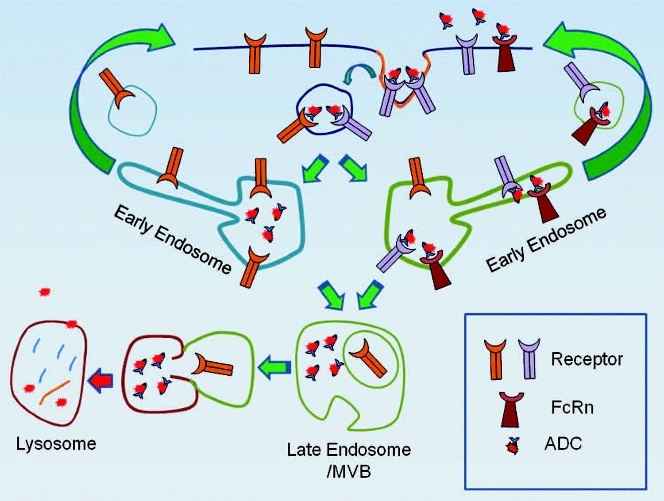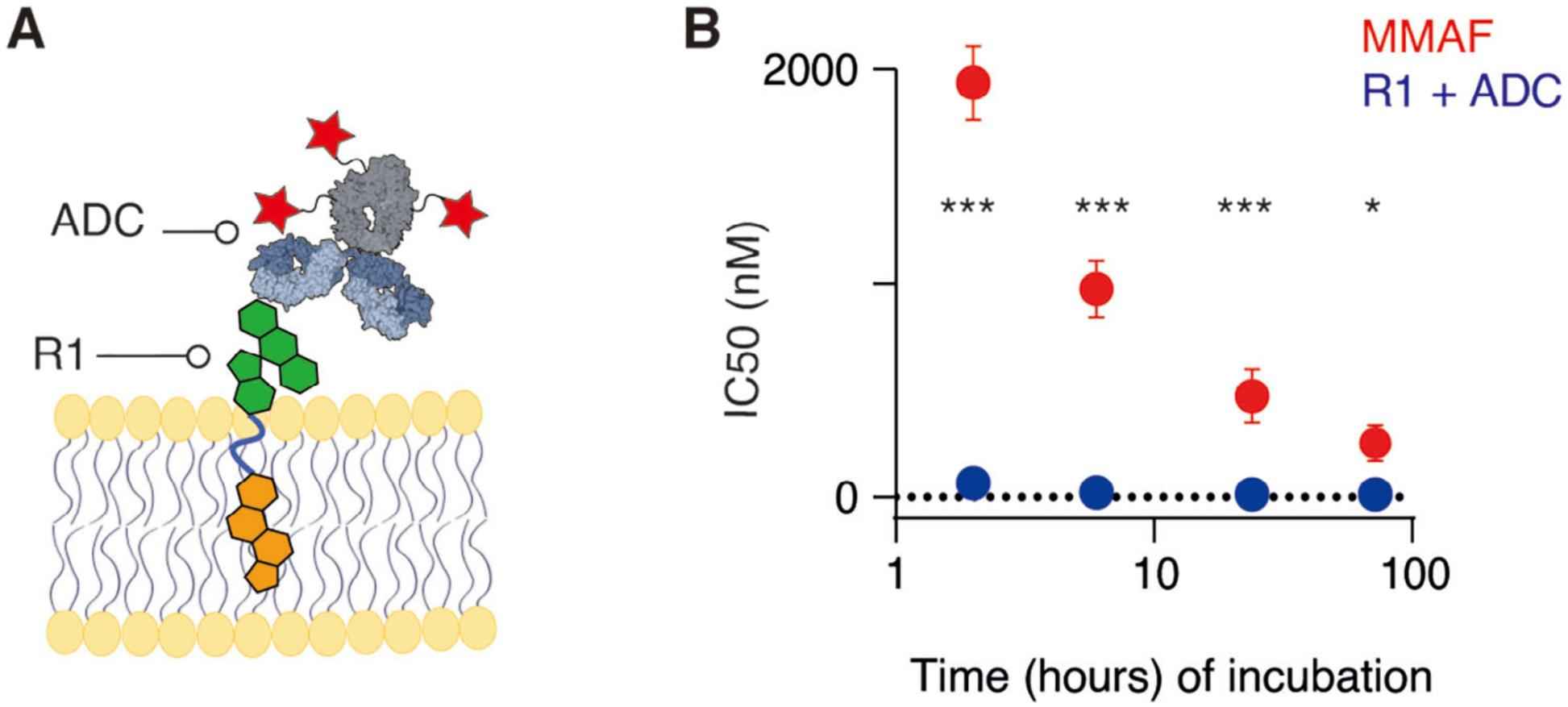- Home
- UTC Development
- Bispecific ADC Development
- Fast-internalizing Receptor based Bispecific ADC Development
Fast-internalizing Receptor based Bispecific ADC Development Services
In recent years, bispecific antibody-drug conjugates (ADCs) have been developed as a promising and effective therapeutic agent for a variety of cancer therapies. Bispecific ADCs possess unique advantages such as the dual antigen target and potent antitumor activity compared with other traditional therapeutic options. With extensive experience in linker-payload synthesis, antibody production, and conjugation technology, Creative Biolabs has constructed a mature system for bispecific ADCs design and construction. Our services will effectively save the time and cost of your discovery programs by taking advantage of our expertise and innovative technology platforms.
Background
The Mechanisms of ADC Internalization
An ideal ADC requires efficient internalization and trafficking to lysosomes to be efficacious. Even with a target highly expressed on a cell surface, if the ADC cannot enter the cell to deliver the payload, the treatment will have limited effect. Molecules can be internalized from the surface of eukaryotic cells through a wide array of mechanisms. These include clathrin-independent mechanisms such as phagocytosis, macropinocytosis, and caveolin-dependent endocytosis or clathrin-dependent mechanisms such as receptor-mediated endocytosis. Clathrin-dependent endocytosis is the best characterized and predominant mechanism for the internalization of cell surface receptors and thus provides an ADC with a cell-specific entry mechanism.
 Fig.1 Possible Intracellular trafficking routes of ADCs.1
Fig.1 Possible Intracellular trafficking routes of ADCs.1
Receptors such as the HER2 continuously recycle back to the plasma membrane immediately after cellular internalization. HER2 is a good target candidate for ADCs. As HER2 is internalized, it provides an entry point for lysosomal delivery of cargos. However, HER2 is also very efficiently recycled back to the plasma membrane, thus when HER2-targeted ADCs bind to their target, they are internalized but mostly do not reach the lysosome, they are recycled, which greatly limits drug release and the overall efficacy of the treatment. This rapid endocytic recycling and limited lysosomal trafficking is a key issue and has been put forward as one of the potential reasons for the disappointing clinical results in several trials of ado-trastuzumab emtansine (T-DM1), an anti-HER2 ADC. When developing an ADC against receptors such as these, one could plausibly attempt to change antibody dissociation within the endosome in an attempt to reduce the likelihood that the ADC will cycle back out of the cell with its receptor.
Our Service
Development Services of Bispecific ADCs Based on Fast-internalizing Receptor
The ideal tumor target for an ADC has the following features: (1) the antigen is abundantly and exclusively expressed on the target cell, (2) it undergoes minimal secretion since secreted receptors can bind the antibody in the circulation, thus limiting exposure to the target cell, (3) it possesses an appropriate rate of endocytosis and (4) it undergoes an appropriate intracellular trafficking route for the desired outcome.
Fast-internalizing receptor-based bispecific ADCs development services at Creative Biolabs include the following receptors:
With years' experience in the field of ADC and bispecific antibody development, Creative Biolabs is committed to providing clients high-quality bispecific ADCs design and construction services in a time and cost-efficient way. If you are interested in our fast-internalizing receptor-based bispecific ADCs development services, please contact us for more details.
Highlights
- Efficient Internalization: Our bispecific ADCs target fast-internalizing receptors, ensuring effective payload delivery to cancer cells, enhancing treatment efficacy, and minimizing off-target effects.
- Advanced Design System: Leveraging extensive experience in linker-payload synthesis and antibody production, Creative Biolabs offers a sophisticated system for the design and construction of bispecific ADCs.
- Innovative Technology: Utilizing cutting-edge conjugation technology, our services optimize the internalization and trafficking of ADCs, leading to superior antitumor activity.
- Time and Cost Savings: Our expertise and innovative platforms significantly reduce the time and cost of discovery programs, providing efficient solutions for bispecific ADC development.
- Proven Success: With a track record of successful ADC projects, Creative Biolabs delivers reliable and effective bispecific ADC solutions for cancer therapy, backed by years of industry experience.
FAQ
-
Q: Why is receptor internalization important for ADC efficacy?
A: Efficient receptor internalization and lysosomal trafficking are crucial for ADC efficacy. Without internalization, the ADC cannot deliver its cytotoxic payload inside the cancer cell, limiting its therapeutic effect. Fast-internalizing receptors ensure that the ADC reaches the lysosome, where the drug is released to exert its anti-tumor activity.
-
Q: How does Creative Biolabs enhance the development of fast-internalizing receptor-based bispecific ADCs?
A: Creative Biolabs leverages its extensive experience in linker-payload synthesis, antibody production, and conjugation technology to develop high-affinity, fast-internalizing receptor-based bispecific ADCs. Their advanced platforms and optimized strategies ensure efficient internalization, lysosomal trafficking, and potent anti-tumor activity of the ADCs.
-
Q: What services does Creative Biolabs offer for fast-internalizing receptor-based bispecific ADCs development?
A: Creative Biolabs provides comprehensive services, including antibody screening, DrugLnk™ custom synthesis, antibody design and conjugation, and thorough in vitro and in vivo analysis. Their expertise ensures the development of highly effective ADCs tailored to specific project requirements.
-
Q: What challenges are associated with targeting fast-internalizing receptors in ADCs?
A: While targeting fast-internalizing receptors can enhance drug delivery, it also poses challenges such as rapid recycling back to the cell surface, which can limit the ADC's ability to reach and impact the lysosome, thereby reducing the overall treatment efficacy.
-
Q: Can Creative Biolabs customize bispecific ADCs for specific cancer targets?
A: Yes, we offer customized bispecific ADC development services, including the selection of target antigens, antibodies, and linkers that are best suited for specific cancer types and therapeutic objectives, ensuring optimal efficacy and safety profiles.
-
Q: How can researchers and developers initiate a project with Creative Biolabs for bispecific ADCs?
A: Researchers interested in developing fast-internalizing receptor-based bispecific ADCs can contact Creative Biolabs for a detailed consultation. Our team will discuss specific project requirements, propose tailored strategies, and provide comprehensive support throughout the development process.
Published Data
The experiment utilized artificial internalizing receptors (AIRs) to enhance targeted drug delivery to chemically engineered cells. AIRs, based on small organic molecules, were designed to specifically mediate endocytosis when combined with cognate antibody-drug conjugates (ADCs). The study demonstrated that AIRs provided nanomolar potency in drug action, significantly outperforming the efficacy of the free drug. The ADCs, when targeted to cells engineered with AIRs, resulted in fast and potent cytotoxicity, with efficient cell killing observed within 2 hours. Additionally, AIRs allowed for selective elimination of receptor-engineered cells in a mixed cell population, minimizing off-target effects and reducing side effects. The results showcased the potential of AIRs for precise, transient cell modifications and highlighted their capability to act as a bio-orthogonal platform for targeted drug delivery, particularly useful in applications like CAR T-cell therapies.
 Fig.2 Artificial receptor-mediated drug delivery is potent and fast.2
Fig.2 Artificial receptor-mediated drug delivery is potent and fast.2
Featured Products
Anti-CD22 ADC
| Catalog | Product Name | Antibody |
| ADC-W-195 | Anti-CD22 (clone 10F4v1)-Mc-MMAF ADC | Anti-CD22 antibody, clone # 10F4v1 |
| ADC-W-216 | Anti-CD22 (10F4v3)-Mc-VC-PABC-MMAE ADC | Humanized Anti-CD22 lgG1 Antibody, 10F4v3 |
| ADC-W-217 | Anti-CD22 (10F4v3)-Mc-MMAF ADC | Humanized Anti-CD22 lgG1 Antibody, 10F4v3 |
| DC-W-331 | Anti-CD22 (clone RFB4)-MCC-DM1 ADC | Chimeric Anti-CD22 Antibody, clone # RFB4 |
| ADC-W-332 | Anti-CD22 (clone 10F4)-AcBut-Calicheamicin ADC | Humanized Anti-CD22 Antibody |
References
- Ritchie, Michael, Lioudmila Tchistiakova, and Nathan Scott. "Implications of receptor-mediated endocytosis and intracellular trafficking dynamics in the development of antibody drug conjugates." MAbs. Vol. 5. No. 1. Taylor & Francis, 2013.
- Søgaard, Ane Bretschneider, et al. "Artificial Internalizing Receptor Affords Fast, Potent, Specific Drug Delivery to the Chemically Engineered Cells." Advanced Functional Materials (2024): 2400048.
For Research Use Only. NOT FOR CLINICAL USE.

Online Inquiry
Welcome! For price inquiries, please feel free to contact us through the form on the left side. We will get back to you as soon as possible.
